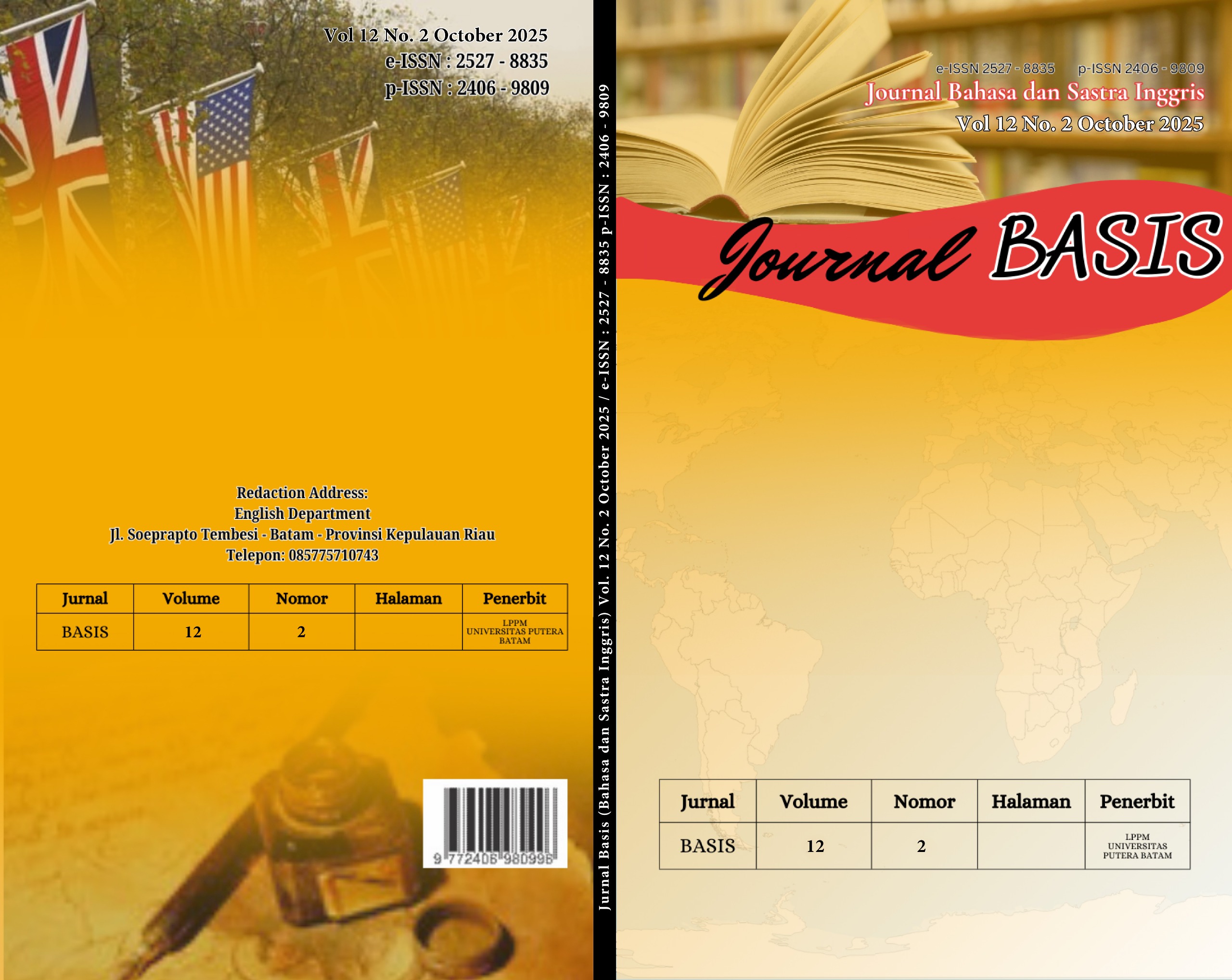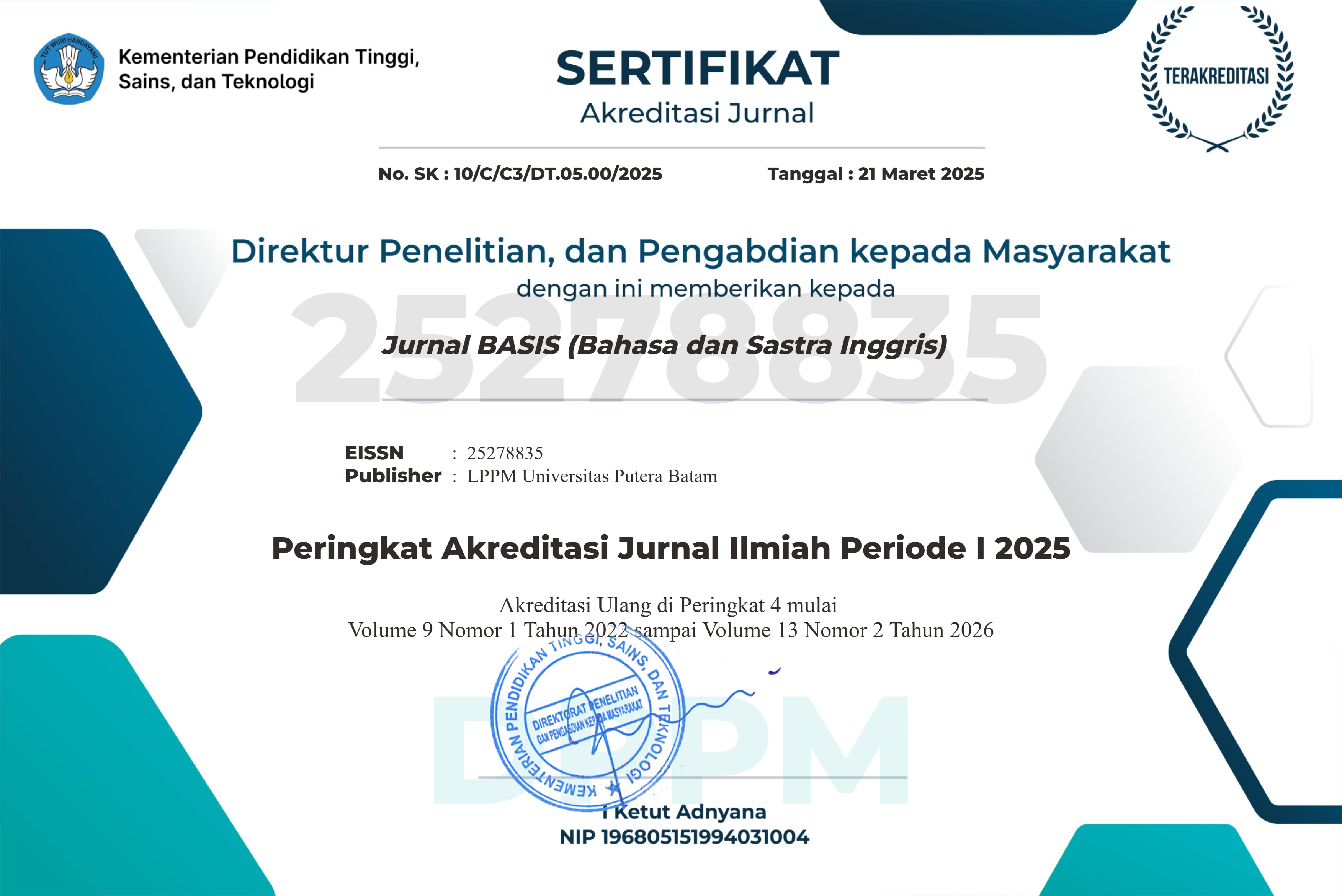SILENCE VOICES AND CULTURIZED MYTHS: ORIENTALIST READINGS OF JOSEPH CONRAD'S LORD JIM
Suara-suara yang Dibungkam dan Mitos yang Membudaya: Pembacaan Orientalis terhadap Lord Jim karya Joseph Conrad
DOI:
https://doi.org/10.33884/basisupb.v12i2.10014Keywords:
Edward said, Inferiority, Hegemony, Joseph Conrad, Lord Jim, OrientalismAbstract
This study aims to critically examine Joseph Conrad’s Lord Jim through the lens of Edward Said’s theory of Orientalism, focusing on how the novel represents the East as subordinate to Western ideological and moral authority. Employing a qualitative literary analysis, this research explores narrative structure, characterization, and setting to reveal how the novel systematically marginalizes Eastern voices and constructs the East as a passive backdrop for the psychological and moral journey of the Western protagonist, Jim. Key findings show that the Indigenous characters in Patusan are denied subjectivity and interiority, their perspectives filtered entirely through the Western narrator, Marlow. The narrative elevates Jim to a position of moral superiority and leadership, reinforcing colonial myths of the “white savior” and the supposed dependency of Eastern societies on Western governance. The absence of Eastern perspectives in the novel underscores the epistemological dominance of the West, making Lord Jim not a true intercultural dialogue, but a monologue that serves Western self-definition. The study concludes that Conrad’s novel, despite its literary complexity, perpetuates Orientalist discourse by silencing the East and reinforcing hierarchical binaries between the West and the non-West. Future research is encouraged to compare such colonial narratives with postcolonial works that reclaim indigenous voices.
References
Alhaj, A. A. M. (2014). Joseph Conrad’s Lord Jim: Reconsiderations. Advances in Language and Literary Studies, 5(6), 212–215. https://files.eric.ed.gov/fulltext/EJ1128316.pdf
Anand, V. (2019). Human Rights Exploitation: Unending Circle of “Beloved” in Toni Morrison’s Beloved. International Journal of English Literature and Social Sciences, 4(2), 291–294. https://doi.org/10.22161/ijels.4.2.17
Couto, R. A. (1994). An American Challenge: A Report on Economic Trends and Social Issues in Appalachia. In Kendall. Hunt Publishing Co.
Crucifix, E. (2019). An Orientalist Masquerade. MHRA Working Papers in the Humanities. https://doi.org/10.59860/wph.a0569e8
de Souza, R. (2019). Undermining Exoticism. Deleted Journal, 14, 38–47. https://doi.org/10.59860/wph.a165dcb
Fåhraeus, A. (2020). Cultural materialism in the production and distribution of exploitative lesbian film: A historical case study of children of loneliness (1935). NJES Nordic Journal of English Studies, 19(5), 121–154. https://doi.org/10.35360/njes.618
Filimonov, K., & Carpentier, N. (2023). Beyond the state as the ‘cold monster’: the importance of Russian alternative media in reconfiguring the hegemonic state discourse. Critical Discourse Studies, 20(2), 166–182. https://doi.org/10.1080/17405904.2021.1999283
Frątczak-dąbrowska, M. (2018). From Racial Difference to Racial Indifference : The Neo- Liberal Narrative and Its Colonial Legacy Through the Example of Washington Black ( 2018 ) by Esi Edugyan. 20, 62–80.
Kerr, D. (2016). Crowds, colonialism, and lord jim.
Kleinhofa, I. (2020). Orientalisms and Occidentalisms: Evolution of Concepts and Divergence of Connotations (pp. 30–45). LU Akadēmiskais apgāds. https://doi.org/10.22364/LURAKSTI.OS.819.02
Mart, Ç. T., Toker, A., & Esen, M. F. (2010). Criticism on Edward Said’s Orientalism. https://eprints.ibu.edu.ba/720/1/ISSD2010Socialscience_p367-p373.pdf
Mendrofa, M. P. (2020). Feminist Critical Discourse Analysis To the Language Use and Display in Whitening Cosmetic Product Advertisements. SAGA: Journal of English Language Teaching and Applied Linguistics, 1(2), 119–126. https://doi.org/10.21460/saga.2020.12.45
Mongia, P. (2016). Narrative strategy and imperialism in conrad’s “lord jim.”
Richardson, E. (2013). Developing Critical Hip Hop Feminist Literacies: Centrality and Subversion of Sexuality in the Lives of Black Girls. Equity and Excellence in Education, 46(3), 327–341. https://doi.org/10.1080/10665684.2013.808095
Rosen, J. M. (2013). Minor characters have their day: The imaginary and actual politics of a contemporary genre. Contemporary Literature, 54(1), 139–174. https://doi.org/10.1353/cli.2013.0003
Said, F. F. S., & Boutouchent. (2020). The Ideological Construction of Otherness in Joseph Conrad’s Lord Jim. 11(02), 89–106. http://revue.ummto.dz/index.php/pla/article/download/2611/1733
Susilawati, A., & Wajiran, W. (2024). a Representation of Zainichi As Subalterns in Min Jin Lee’S Pachinko: Postcolonial Studies. Lire Journal (Journal of Linguistics and Literature), 8(2), 245–257. https://doi.org/10.33019/lire.v8i2.319
Vogel, D. (2012). Joseph Conrad in the light of postcolonialism. 7, 97–112. https://doi.org/10.4467/20843941YC.12.005.0694
Wajiran, W. (2013). The Domination of Ideas and Intellectuality in Gaining the Power and Hegemony in Man And Superman by George Bernard Shaw. Jurnal Humaniora UGM, 25(2), 143–150. https://doi.org/https://doi.org/10.22146/jh.2357
Wajiran, W. (2020). Images of Muslim women in contemporary Indonesian literature. University of Tasmania.
Wajiran, W. (2022). Pengantar Pengkajian Sastra Karya Sastra dan Dinamika Sosial Politik (B. Asyhari & R. Pruwandari (eds.)). UAD Press.
Wajiran, W., & Septiani, N. A. (2023). The subordination of black people in the United States Toni Morrison’s novel, Beloved. NOTION: Journal of Linguistics, Literature, and Culture, 5(1), 69–81. https://doi.org/10.12928/notion.v5i1.7064













 JURNAL BASIS (BAHASA DAN SASTRA INGGRIS)
JURNAL BASIS (BAHASA DAN SASTRA INGGRIS)
